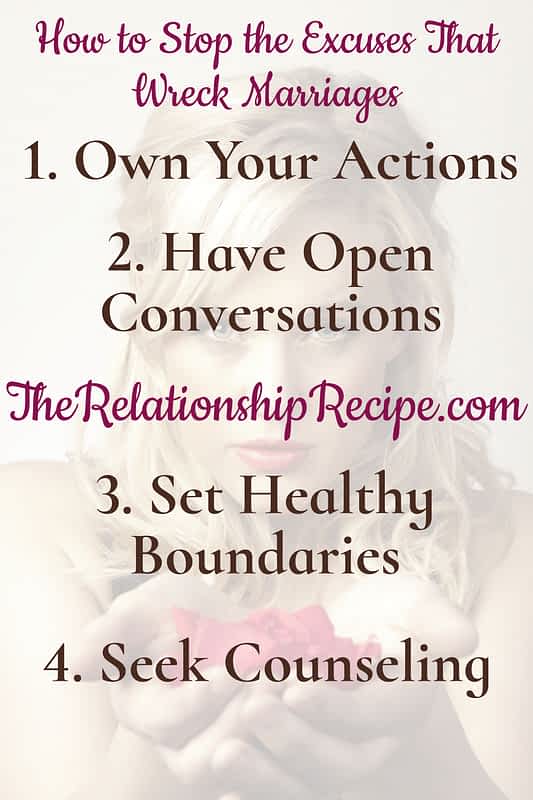9 Toxic Excuses That Wreck Marriages: Stop the Blame Game
Tired of hearing the lame justifications that keep you stuck in an endless loop with your partner? Does it seem like no matter how hard you try, your relationship continues to fall into a cycle of excuses that wreck marriages?
You’re not alone.
If you’re constantly blaming each other, or avoiding hard conversations, you might be caught in patterns that are slowly turning your relationship into one of those marriage destroyers that take away trust, intimacy, and closeness.
🚀The toxic excuses you make, or accept, can be far more destructive than you realize.
In this article, we’ll break down 9 excuses that wreck marriages, why they are marriage destroyer, and how to stop letting them dictate your relationship’s future.
Understanding and addressing these toxic habits will not only prevent emotional distance, but also help you reclaim the love and happiness your relationship needs.
💡Key Highlights:
- The most toxic excuses that wreck marriages.
- How the blame game kills trust and intimacy.
- How to stop using excuses and start communicating.
- Simple strategies to strengthen your relationship today.

Why These Excuses are Marriage Destroyers
Excuses in marriage are a huge factor in a tanking a relationship, because they create a cycle of avoidance and resentment.
When one of you continually deflects responsibility, it prevents accountability and stalls growth. Over time, this erodes trust, as the other person feels unheard or invalidated.
Studies show that when partners use excuses to avoid addressing issues, they reinforce a lack of emotional maturity and get in the way of open communication,which are essential for a healthy relationship.
As trust and respect begin to decline, the emotional connection weakens, making it more difficult to resolve conflicts. Without accountability, problems become unresolved, leading to frustration and eventually the other person will start to emotionally detach.
For example, when one of you continuously makes excuses for neglecting their responsibilities, the other person may begin to feel as though their needs are being ignored, which can lead to feelings of abandonment or isolation.
Excuses also cultivate a power imbalance, where one partner consistently avoids responsibility, creating a toxic environment with no mutual support. This dynamic can contribute to the breakdown of the marriage, as both of you stop investing in making things work. Why bother if all you get is one lame excuse after another?

Common Toxic Excuses That Wreck Marriages
🚩1. “I Didn’t Mean It That Way”
Why it’s a marriage destroyer:
This excuse is used to deflect blame after an empathic rupture or an emotionally charged situation that hurt the other person. While it’s possible that someone didn’t mean to hurt their partner, repeatedly using “I didn’t mean it” denies the impact of the words or actions. This minimizes the hurt caused and damages emotional intimacy.
The deeper problem:
By refusing to accept responsibility, you prevent growth. Over time, this excuse will make your partner feel unseen and unheard, slowly chipping away at your relationship. Excusing hurtful actions with “I didn’t mean it that way” becomes one of the marriage destroyer that prevents healing and the other person’s ability to move on from it.
The fix:
Instead of deflecting, acknowledge the feelings behind the issue. Saying, “I understand how that hurt you, and I’m sorry” shows your partner that their emotions matter, which strengthens your bond.

🚩2. “You Know How I Am”
Why it’s a marriage destroyer :
This excuse is often used when someone refuses to take responsibility for their actions. It implies that the behavior is ingrained, suggesting that there’s no room for change, and that it’s not going to happen. The problem is that growth is essential in any marriage, and saying “you know how I am” stops that process as well as bring a really weak reason for the intent behind the words.
The deeper problem:
When you use this excuse, you’re telling your partner that your flaws are non-negotiable. Over time, this causes frustration and a sense of helplessness, pushing both of you further apart.
The fix:
Instead of using your past as an excuse, focus on growth. Recognizing your behavior and working together to improve is key to overcoming excuses that wreck marriages. Acknowledge your shortcomings, then take action to change. It’s not that hard.

🚩3. “I’m Too Tired to Talk About This Right Now”
Why it’s a marriage destroyer:
While exhaustion happens to all of us, constantly using it as an excuse to avoid emotional conversations only worsens things. When you brush aside your partner’s concerns because you’re “tired”, it signals that your relationship isn’t a priority.
This leads to unresolved issues and growing emotional distance which is one of the worst marriage destroyers .
The deeper problem:
Repeatedly avoiding important conversations can lead to feelings of neglect and emotional abandonment. Over time, your partner might feel that their concerns are irrelevant, and that erodes the emotional closeness needed for a healthy relationship.
The fix:
Make time for your partner. Even if you’re exhausted, set aside a few minutes to check in. If you really are too tired, be honest and schedule a time to talk later. Let your partner know you value their emotions.

🚩4. “It’s Your Fault for Getting Upset”
Why it’s a marriage destroyer :
This excuse blames your partner for their emotional reaction, shifting responsibility away from the actual issue. It’s a form of gaslighting that manipulates the situation, making the person who is hurt feel like the one at fault.
The deeper problem:
When you constantly tell your partner it’s their fault for being upset, it creates an emotionally toxic environment. This kind of behavior cultivates resentment and discourages open communication, two major marriage destroyers.
The fix:
Instead of deflecting blame, own your actions like an adult. Listen to your spouse’s feelings, validate them, and apologize when necessary. By doing so, you create trust and create a safe space for future discussions.

🚩5. “I’ll Change, (But Not Today”)
Why it’s a marriage destroyer:
Promises of change, like apologies, are manipulaltion if they aren’t backed up by action. Saying, “I’ll change – but not today” only delays progress, leaving issues unresolved and stagnating. This is one of the most dangerous excuses that wreck marriages, as it leads to empty promises and broken trust. It’s a form of future faking at best, and covert manipulation at it’s worst.
The deeper problem:
Empty promises create a cycle of disappointment. When your partner hears “I’ll change” repeatedly, but never sees action, they begin to lose faith in your commitment to the relationship – or that it will ever get better and grow.
The fix:
Instead of vague promises, set a clear plan of action. Say, “I’ll take this step today to improve.” Following through on small commitments helps rebuild trust and keeps your relationship moving forward.

🚩6. “I Was Just Joking”
Why it’s a marriage destroyer:
This lame excuse is often used to mask hurtful or inappropriate comments. When something is said that hurts your partner, covering it with “I was just joking” dismisses their feelings and prevents a real conversation about the issue.
Over time, this excuse becomes a tool for deflection, making it harder to address serious issues in the marriage.
The deeper problem:
Repeatedly using humor as a shield creates emotional disconnection. Instead of addressing the real problem, it trivializes it, leading to frustration and resentment – two things that ruin marriage.
The fix:
Stop using humor as a defense mechanism. If you hurt your partner, own up to it and apologize. Let them know that you understand the impact of your words and that you value their feelings.

🚩7. “I Didn’t Have Time”
Why it’s a marriage destroyer:
This excuse is often used when a partner neglects their relationship, claiming they were simply too busy to engage. If “I didn’t have time” becomes a recurring excuse, it implies that your marriage isn’t a priority, leading to emotional neglect which is one of the most damaging marriage destroyers.
The deeper problem:
Over time, neglecting your relationship can cause deep emotional rifts. When one partner feels like they don’t have time for the other, they begin to feel unimportant and unloved.
The fix:
Prioritize your relationship, even when life is busy. If you’re truly overwhelmed, communicate and set aside dedicated time for your partner. It shows that despite external stressors, your connection matters most.

🚩8. “It’s Not a Big Deal”
Why it’s a marriage destroyer:
When you repeatedly dismiss your partner’s concerns with “it’s not a big deal,” it minimizes their feelings. This is a form of emotional invalidation, which builds resentment and erodes intimacy. Dismissing issues as trivial is a prime example of excuses that wreck marriages, and to be honest, after a while it gets infuriating – as if your feelings don’t matter, or are ridiculous.
The deeper problem:
Constantly belittling your partner’s feelings causes them to shut down. Over time, they may stop bringing up issues altogether, because they won’t be taken seriously anyway.
The fix:
Even if you don’t think the issue is significant, take your partner’s feelings seriously. Acknowledge their perspective and work together to resolve the problem, no matter how small it may seem.

🚩9. “I Was Raised That Way”
Why it’s a marriage destroyer:
Blaming your upbringing for your behavior prevents personal growth. “I was raised that way” is an excuse that can trap you in unhealthy patterns. Relationships require constant self-awareness and growth, and using your past as a crutch prevents this progress.
The deeper problem:
This excuse cultivates a fixed close-minded mindset. Over time, it can make the other person feel like they’re in a relationship with someone who is unwilling to grow or change, contributing to one of the most destructive marriage destroyers – stagnation.
The fix:
While acknowledging your upbringing is important, it’s equally important to take responsibility for your actions. Commit to working through behaviors that harm your relationship and make steps toward self-improvement.

How to Stop Leaning Into the Excuses That Wreck Marriages
✔️1. Own Your Actions
The first step to ending toxic excuses is owning up to your behavior. Acknowledge mistakes, apologize sincerely, and take steps to change. When both partners commit to this, the marriage improves.
✔️2. Have Open Conversations
Instead of deflecting, focus on healthy communication. Approach tough topics with compassion and a willingness to listen. Ask questions like, “How can we fix this together?” and “What can I do differently?”
✔️3. Set Healthy Boundaries
Make it clear that excuses and blame are not acceptable. Create an environment where honesty is valued and emotional maturity is expected. This sets the tone for a healthier, more supportive relationship.
✔️4. Seek Counseling
If the cycle of excuses feels too deep-rooted to break alone, couples counseling can help. A therapist can guide you in understanding the reasons behind the blame and teach both partners healthier coping mechanisms.
By addressing these excuses head-on, you can prevent your marriage from becoming another statistic of failure due to blame. Recognize the problem, take action, and build a relationship that thrives on love, trust, and mutual respect.

Final Thoughts the Excuses That Turn Into Marriage Destroyers
Toxic excuses that wreck marriages are more than just an annoyance; they are marriage destroyers that can tear apart the emotional fabric of your relationship. These excuses build emotional walls, create resentment, and stop couples from growing together.
You didn’t enter your relationship to be mistreated, overlooked, or abandoned.
If these issues are happening, your partner must make significant changes by getting professional help, whether individually or as a couple, is critical. However, if your partner resists counseling or change, you have to acknowledge that they may never evolve, forcing you to decide whether to tolerate the situation or move on to a healthier relationship.
FAQ’s
What are some excuses that wreck marriages? Excuses like “I didn’t mean it,” “You know how I am,” and “I’m too tired” prevent healthy communication and accountability.
How do I stop blaming my partner? Focus on owning your actions, listening with empathy, and taking accountability. Effective communication and mutual respect are key.
Why do men make excuses in relationships? It’s often due to fear of vulnerability, a desire to avoid conflict, or a lack of awareness of the damage it causes. Mistakes men make in relationships include avoiding tough conversations or deflecting blame.
How can excuses affect intimacy? Constant excuses and blame prevent real connection, reducing emotional intimacy. When couples can’t talk openly, their emotional bond weakens over time.
Thank you for reading this post, don't forget to subscribe!







